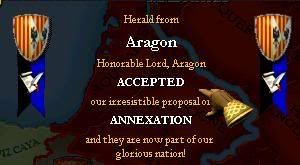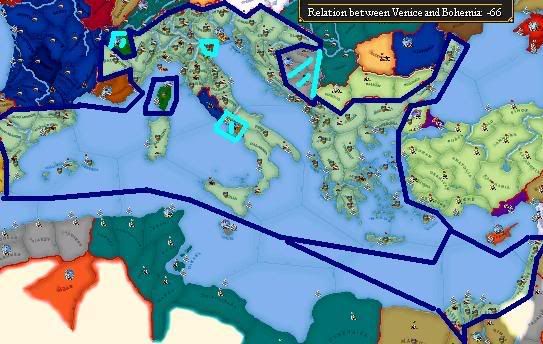1472
1472 begins with
France making good it's claims to Provence. Normally the Italian nation would not want France to cross the river between the two by annexing Provence, but Italy is too caught up in it's civil war to convince France to back down.
February, some good news finally reaches the capital -
Vlore has been converted to Catholicism, eliminating Orthodoxy from Albania and the Adriatic coast.
March 2,
an inquisition in Thessaly is a success. Catholicism has started to beat back the Orthodox segments of Christianity. Though a great deal of the Balkan provinces are now converted, they remain faithful to Alfons, who's forces have taken over most of Italy.
In May, Alfonso's forces have overrun most of the Italian peninsula, besieging Ferrara and slowly making their way across the Po. Defectors come from as far as Dauphine to support the populist general.
Milan falls within weeks, and soon only a few scattered territories remain under Government control. Admiral Mocenigo causes the last bits of the navy to desert, and as a result, Alfons is ferried right into Venice. He and his forces take power in July 17. 12 days later,
Mocenigo leads a more popular-oriented coup with the support of many officials, and they depose Alfons. Alfons is shipped off to the Balkans to become a governor, where he remains very popular amongst the Orthodox and Bulgarian peoples.
Mocenigo takes the name Peter I di Mocenigo, and points to the fact most supported his bid for power to legitimise his rule. He will rule the Italian Kingdom for several years.
--- End of the Civil War and Mocenigo's Italy ---
The Civil War had finally ended. Venice was greatly impacted, and fires and riots still raged in parts of Italy's empire as Mocenigo took the seat of power. He would clean it all up within the first few years of his term.
Pietro Mocenigo established - for lack of a better word - a military dictatorship. He also pardoned many of the old officials, as Alfons had marked most of them for death. He promised to increase cultural tolerance, while making Italy strong and respected. He argued that it was not only morally right to be humane and tolerant, but it also greatly increased trading income and the efficiency of government. The Venetian system knew this all too well, Venice's status as a great trader had greatly reduced religious ignorance's ability to permeate it.
Mocenigo advocated the idea that Arabs - even of Islamic practice - should have just as many rights as the common Italian. He also believed the Bulgarians and Orthodoxists should be treated as equals. He and the General Council - which was now composed of both soldiers and citizens - drew up a new constitution for the government, which gave suffrage to all males who could own property - regardless of religion and ethnicity - in their own local elections. While sexual discrimination would remain in practice for a long time, Mocenigo was not crazy enough to attempt such radical restructuring of society.
He reformed the way the King was elected, instead of being chosen by a complicated series of lots - which had become very cumbersome due to the fact the empire had nearly 1,000,000 citizens - each Italian or Croat-dominated province would send 1 representative to cast a vote for King, and each province would send a candidate for King as well. To solve the problem of minorities, instead of granting votes by province, he granted them by ethnicity or religion: Bulgarians sent 1 representative, Albanians sent 1, Dalmatians sent 1, Aragonese sent 1, Serbians sent 1, French sent 1, Greeks sent 2, Arabs sent 3, Orthodoxists sent 2, Muslims sent 2. This was argued as unfair as it gave several people 2 votes(because of ethnicity and religion), but conservatives were pleased as this still made Italians the dominant group in elections.
The level of equality in Mocenigo's Kingdom was far from perfect, but it did get the ball rolling, and later rulers - such as Marius the Great - would perfect his work. The Civil War had ended, and Italy was ready to prosper once more, like a great phoenix rising from the ashes.
Effects:
Stability jumps to 3(popular leader, end of the war)
Arabic and Bulgarian become accepted cultures. (Serbian and French minorities not included because they are still far too small - one province each)
Venice's ducats reduced to 0(costs of the civil war, radically-altered government).
Innovativeness + 1
---
--- First Ten Year Plan(1470-1479) ---
Mocenigo reformed administration, by abandoning the Five Year Plans, which originated in Francesco Foscari's rule, and instead creating 10 year plans in their stead. Mocenigo's argument was that 5 years was far too cumbersome to implement far-reaching policies without tearing the fabric of stability apart. The 5 year plans had originated as a Venetian institution, and while Venice was large, it was nowhere near the scale of the vast, wealthy, diverse realm Italy ruled.
Mocenigo dominated the General Assembly, of course. As they completely scrapped the old Constitution and drew up a new one that would last into the future, it was time for a here-and-now policy. Mocenigo thus gained great acceptance for his Ten Year Plan, which was rather foreign and diplomatically-oriented for a change.
First of all, the Ten Year Plan stated that Italy should always stockpile resources - as it had done so well prior to the agreement with the French. He said it was unacceptable for such an important nation to go from 1,000,000(1,000)+ ducats to 0 in a matter of about 5 years. It was thus agreed that Italy would always keep around 200 ducats. He said Italy should consider a new form of income - loans, which could supplement money gained from taxes and trade. He said that there was "income security in income diversity."
On a further note of diplomacy, he said that Italy was in a sorry state diplomatically. It had negative relations with nearly all of Europe's powers, most below the 0 mark on a -200 to 200 scale. This was no doubt due to it's badboy status and belligerent behavior on the continent. Mocenigo stated that closer relations should be sought with Castile, Aragon, England, Austria, Hungary and even the Ottomans and Byzantines if necessary. By becoming warm towards all these countries, it would be possible to forge a new alliance and expand Italy's power by proxy. Since relations were already warm with France(150+ and a royal marriage), it was recommended that Italy should finish it's task of annexing the semi-autonomous Duchy of Ferrara(and Naples later) so it could form a new alliance with them. This would also put the dream of Mare Nostra to rest - as Ferrara was the last Adriatic territory left unconquered by Italy.
Domestically, Mocenigo argued for the further Catholicisation of the Balkans. The fact that tolerance had to be balanced between Islam, Orthodoxy and Catholicism created a delicate situation - as the religious revolts of the Civil War proved. As there were far fewer Orthodox believers in the world - foreshadowing Mocenigo wanted more Islamic turf - it was said they should be converted first. His primary targets were Athens and Rhodes - the largest Orthodox cities in the empire, with more then 20,000 inhabitants each.
The General Assembly near-unanimously agreed with the First Ten Year Plan. It was time for Italy to establish domestic and international harmony - through peaceful methods, a first for an Italian ruler.
---
But just as the Civil War in Italy ends, another breaks out in Savoy:
Mocenigo assumes the people wish to align themselves with Italy once more, after all, the Savoyards are the illegitimate children of the Italians and French. Becoming a part of Italy or associating with it would grant them the benefit of protection, while also giving them some rights to choose it's leader.
August 8,
Poland's war with the Turks ends. Despite controlling the whole of the Turkish Balkans, they wish for the port of Dobrogea - which Italy has a core on. While it could be taken by war, Mocenigo believes that diplomacy is just as effective as war. He says Italy should be like the water he was an admiral on for so many years -
gentle and the bringer of life and prosperity, yet able to bring catastrophe and destruction in an instant.
The year passes by, with Mocenigo ending his first year in office on a positive note.

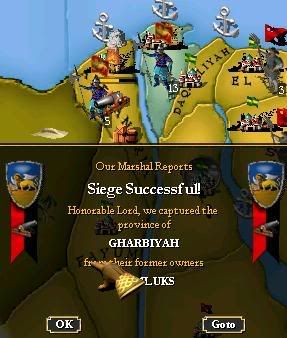

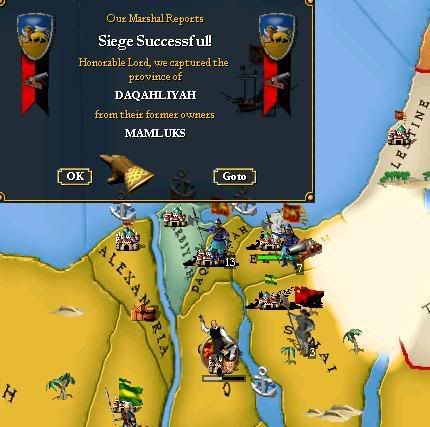
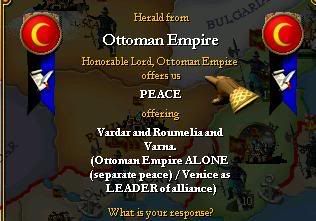

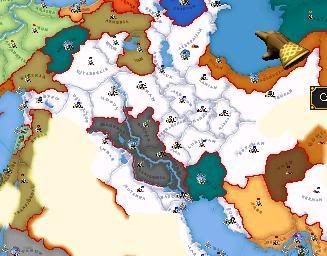
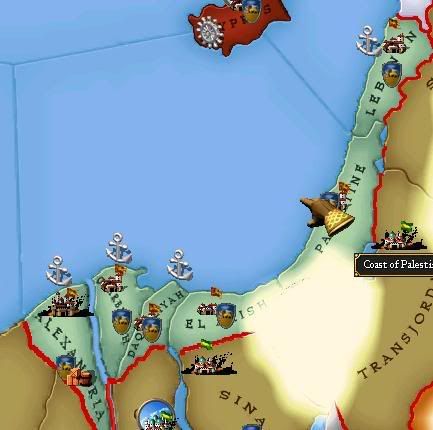
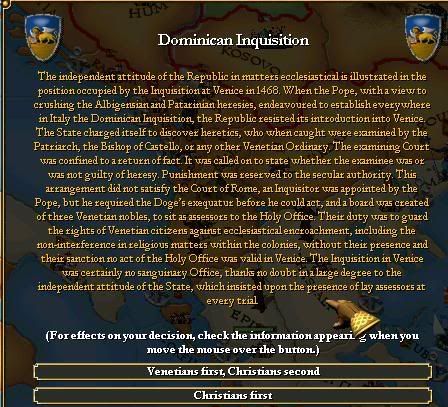
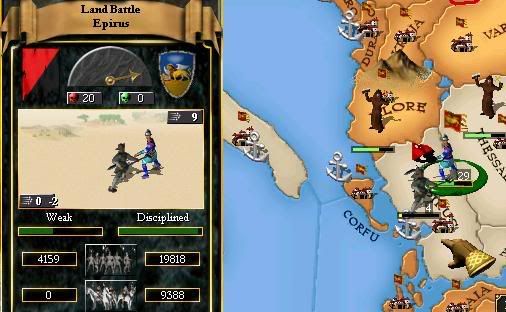

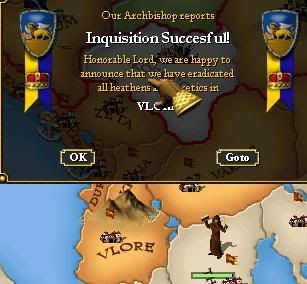
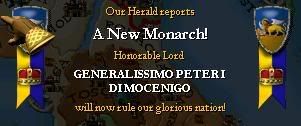
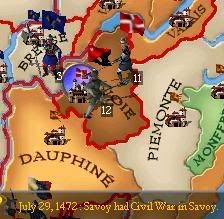
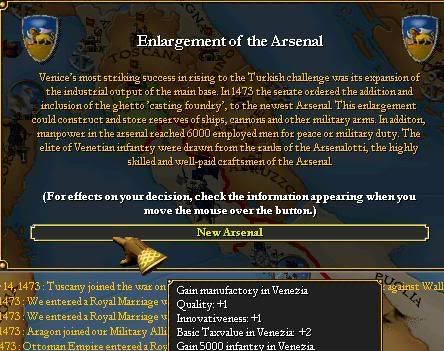
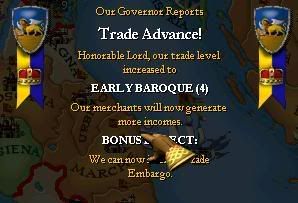


 Comparable to the Netherlands - though the Venetians were never THAT liberal to my knowledge. O.o
Comparable to the Netherlands - though the Venetians were never THAT liberal to my knowledge. O.o Accepted cultures will bring more stability, but so will near-uniform religious practice. Once I've eliminated Orthodoxy from the Balkan region... expect a great crusade.
Accepted cultures will bring more stability, but so will near-uniform religious practice. Once I've eliminated Orthodoxy from the Balkan region... expect a great crusade. 